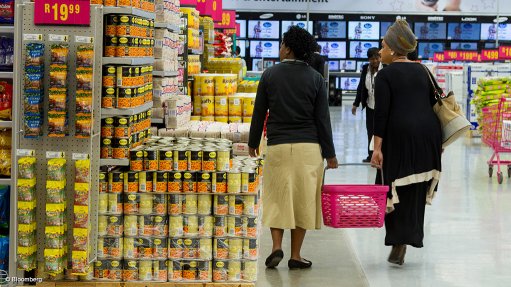
Consumer price inflation, measured by the consumer price index (CPI) increased by 0.4% to 5.8% during January, Statistics South Africa (Stats SA) said on Wednesday, adding that, on average, prices increased by 0.7% between December 2013 and January 2014.
Stats SA recorded a 1.6% month-on-month increase in the food and nonalcoholic beverages index to 4.3% in January, while the transport index increased by 1.2% month-on-month, mainly as a result of a 38c/ℓ increase in the petrol price.
Banking group Investec pointed out that food prices and transport costs contributed 0.2% each to the monthly CPI percentage change, stating that the increases were directly driven by drought and the rand weakness.
Investec also said the residual effect, which accounted for small inflation pressures that were too minor to be captured by the main categories, contributed 0.2% to the change, adding that this could hint at some second-round effects of the rand weakness.
Meanwhile, Nedbank stated that inflation would likely continue to rise, breaching the Reserve Bank's 6% upper target range in the second quarter of the year, remaining above 6% for a few months after that.
“The biggest risk to consumer inflation remains the volatile currency and perhaps food prices,” the bank said.
Investec stated that it expected CPI inflation to average 5.9% year-on-year in 2014; however, should the economy weaken further as a result of work stoppages, owing to insufficient electricity supply and strike action, CPI inflation would likely be lower.
“Currently, CPI inflation is being bolstered by the high administered price inflation rate, of 9.3% year-on-year – without it CPI inflation would be 5% year-on-year,” Investec said.
Further, Investec also noted that demand pressures remained relatively subdued in South Africa’s slow growth environment, with low confidence in the economy and the 50 basis points hike in interest rates in January expected to keep demand modest.
“Retailers continue to report lower volumes and tougher times faced by consumers financially, especially those that are credit active, meaning that, although prices are rising at the tills, consumers are either downtrading or buying less, with clear evidence manifesting of consumers exerting self-limiting behaviour,” Investec said.
The banking group further highlighted that the outcome of the CPI should not be misinterpreted to read that demand is rising, or even that higher prices were being absorbed by the consumer and, therefore, would become entrenched.
“Instead, retailers have been battling under sharply escalating State-controlled prices such as water, electricity, property rates and taxes and transport. Labour costs are rising rapidly too because of this escalation in administered prices and resultant strike action. Retailers are passing these costs through, along with the impact of the rand’s weakness, but consumers are not necessarily absorbing them,” Investec said.